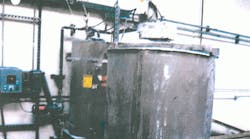One of the most useful proverbs that I learned in my journalism classes was “tell a friend.” It’s an adage that can apply to any kind of storytelling – fiction or nonfiction – but it was especially helpful to me when I was starting out as a small-town newspaper reporter. Overworked, overtired and overcaffeinated (but underpaid, of course), “tell a friend” was a life preserver for me in my most desperate moments of deadline-induced writer’s block.
The idea is simple (“keep it simple, stupid” – there’s another useful maxim): If you’re having a hard time writing the story, write it in the same way that you would tell a friend. If you want to picture yourself telling a friend while enjoying a cold, frothy beverage, go right ahead (that’s what I like to do).
I bring this up because I’m struggling to articulate my feelings about a recent story that I wrote, so I thought it would be interesting to use the “tell a friend” method for the purposes of this blog post.
If I were at a bar, trying to explain this story to a friend, I might say something like this:
"There was this factory in California. It’s not around anymore, because it blew up.
Anyway, the corporation was pressuring the guys at the plant to do plastic extrusion – that’s where you melt plastic to form it into stuff. But this was a new operation. So the plant guys had to set up the plant for plastic extrusion and install the equipment to do plastic extrusion. Are you with me so far?
This is the crazy part: To do plastic extrusion in a factory, you need an industrial-grade boiler, right? I mean, everything in a factory should be industrial-grade, but that goes without saying. Well instead of using an industrial-grade boiler, the guys at the plant decided to buy a Whirlpool water heater from Lowe’s! Just because it was a lot cheaper and easier to install. Can you believe that?
So the guys in the plant jury-rigged it and used it to melt plastic for their operation. They even removed all the safety features. But this Whirlpool was not designed to do the kind of stuff you do in a factory! It was a Whirlpool, for God’s sake!
Anyway, they had all kinds of problems with this thing. It was breaking down constantly. Keeping this thing working was practically a full-time job for the maintenance guys. The thing was always on the fritz, because it wasn’t designed to do this stuff. I’m surprised it lasted as long as it did.
So the water heater exploded and killed two guys who were trying to fix it. The thing blew through the roof like a rocket. It ****ed up the factory so bad that that the factory shut down for good.
So the state of California charged two of the plant guys with felonies, and now they have to pay $450,000 to the families of the two guys who died. If they don’t, they’d go to jail, but only for 90 days."
At this point, my friend and I would shake our heads solemnly, before taking hearty swigs from our mugs.
Taking this tell-a-friend exercise to its logical conclusion, the rest of the conversation might go like this:
Friend: "How long did they use this water heater?"
Me: "A year or two."
Friend: "And nobody said anything about it? Nobody reported it to OSHA? Somebody had to say something to somebody."
Me: "Apparently not. It’s just hard to imagine that not even one person blew the whistle on this. It had to be obvious to most of these plant guys and even the corporate guys that this thing was a ticking time bomb. I mean, these people are adults."
Friend: "Adults do a lot of stupid things. Just look at us."
Me: "But people don’t die because of our stupid things. At least not yet."
Friend: "True. It’s just a shame that two people had to die because all this company cared about was making money."
Me: "In a way, I think I can understand why these factory guys didn’t say anything about the water heater. They’re people – they have families and mortgages and bills. They didn’t want to lose their jobs. It was self-preservation. They were just trying to make a living, like the rest of us."
Friend: "So it’s the company’s fault? The CEO should have to pay the $450,000?"
Me: "Maybe. I don’t know. There’s a lawsuit against the company too. The executives set the tone for the rest of the factory guys. Maybe the executives said, 'Find a way to get it done. We don’t care how you do it. Just get it done.' It seemed like they put an awful lot of pressure on the factory guys to get things up and running really fast."
Friend: "But if the executives didn’t know that the factory guys bought a cheap water heater from Lowe’s, how can it be their fault?"
Me: "Good question. I don’t know, to be honest. The factory guys were the ones who decided to buy the residential water heater. Maybe it’s everyone’s fault. Maybe everyone in the company failed those two guys who got killed. I just don’t know. I just don't understand it."
Some stories are so inexplicable, so unfathomable, so maddening that you just have to tell a friend about them. For me, this was one of them.
